Mini Eucharistic Congress 2025
Location:
Church of Saint Benedict: 2200 W. Ithica St, Broken Arrow, OK 74012
Date:
November 5 – 8, 2025
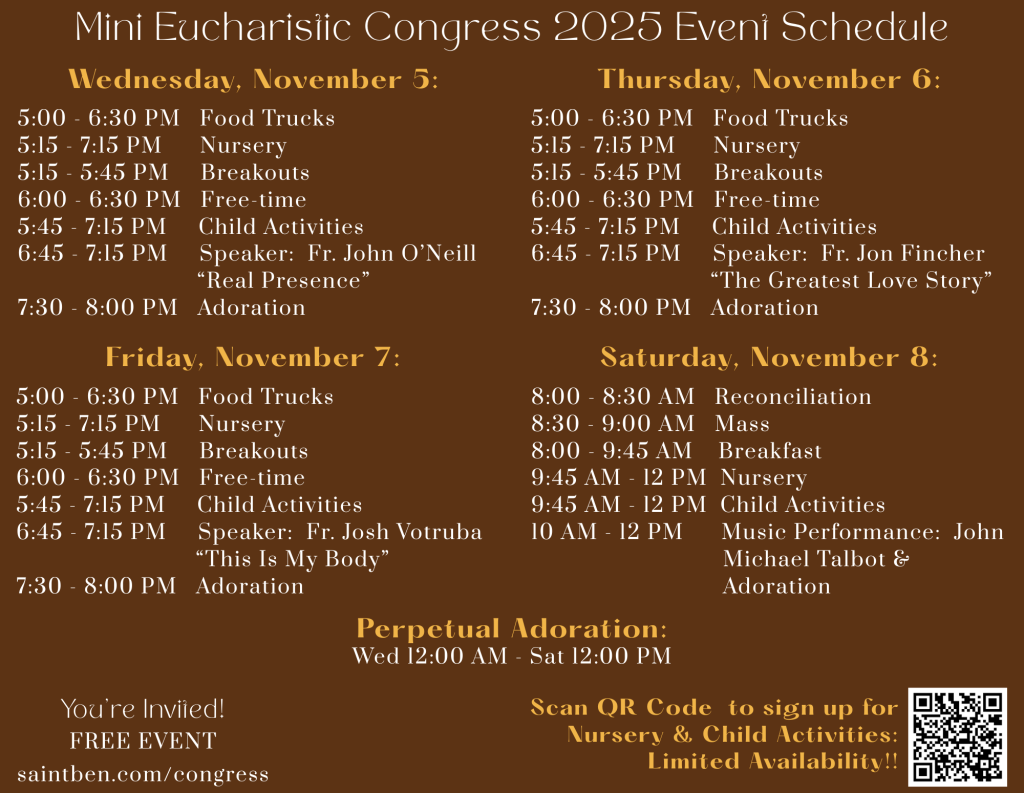
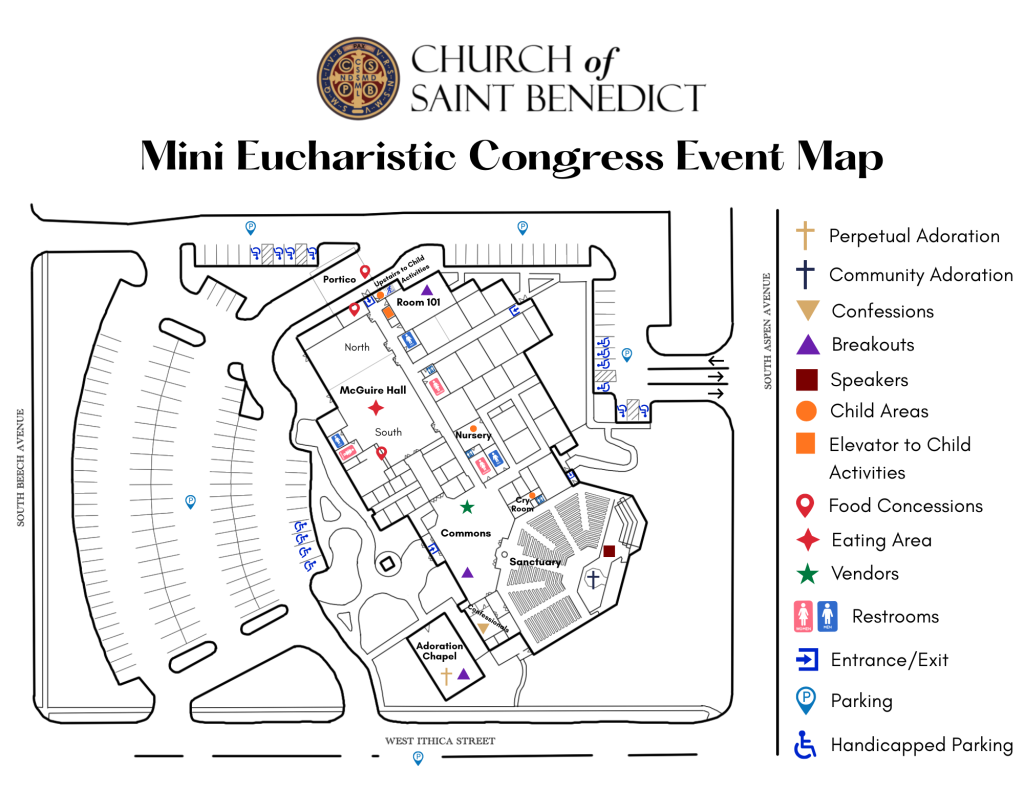
What is a Eucharistic Congress?
A Congress brings us together to encounter Jesus in the Holy Eucharist and to celebrate His redeeming presence. In turn, the Holy Spirit converts us, transforms us, and makes us witnesses to others. The Congress blends Mass, talks, Adoration, prayer, processions, and music for a joyful experience of faith, fellowship, and family. It reveals our desire to love and glorify Jesus in the Holy Eucharist.
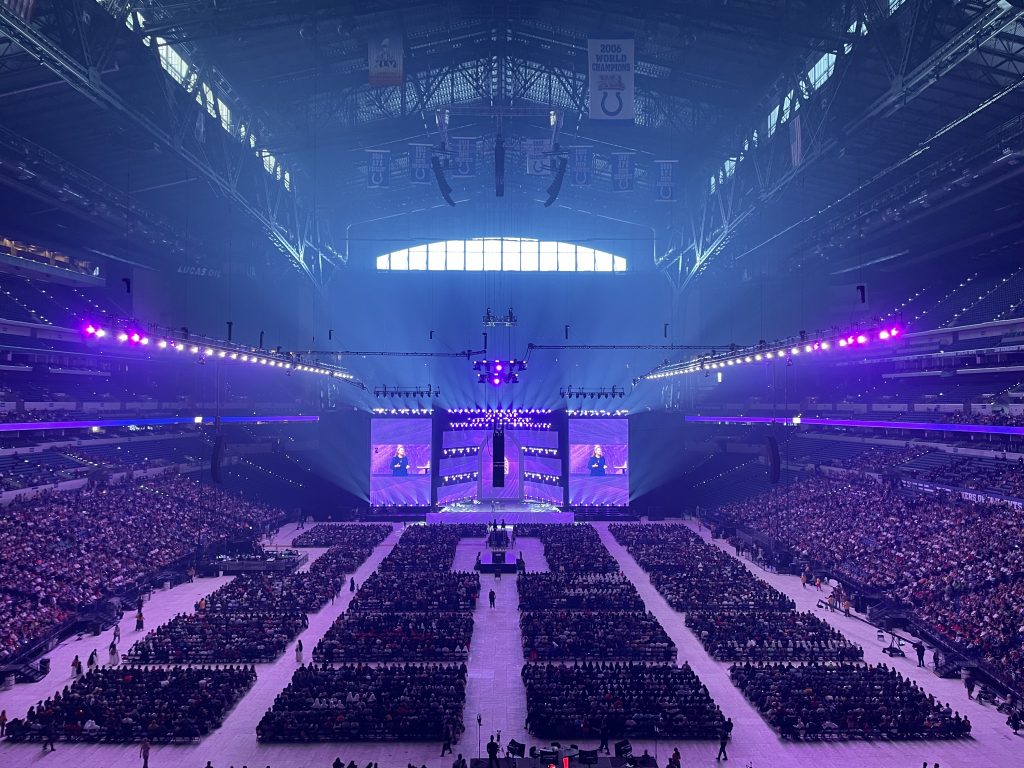
2024 National Eucharistic Congress
Indianapolis, IN – Lucas Oil Stadium
Click here to watch full videos of the speakers from the 2024 National Eucharistic Congress, including Fr. Mike Schmitz, author Chris Stefanick, and more.
Encounter and Conversion
Conversion is a turning of the heart to God. But it is more than one dramatic encounter. God constantly draws us to Him. And so, if our hearts are open, we experience constant turnings for a deepening union with Jesus as children of God. By the Holy Spirit, our love of God gradually deepens, turning our hearts from self-love to love of God.
“A new heart I will give you, and a new spirit I will put within you.”
—Ez 36:26—
Jesus comes to us in the Eucharist.
The Eucharistic Congress focuses on a particular conversion. Pope Benedict XVI wrote about a “conversion born of the Eucharist”. At Mass, Jesus confronts us with His death on the Cross for love of us. God became man, died, and redeemed us to live the divine life with Him. Then, Jesus comes in the Eucharist—Body, Blood, Soul, and Divinity—as a living testimony of divine love, walking with us, even within us. “He became like us…that we might become like Him” (St. Cyril). Conversion turns us to God. But transformation forms us in Christ’s likeness. We begin to die to self: “The life I live now is not my own; Christ is living in me” (Gal. 2:20). We grow sensitive to the Holy Spirit’s movement; we deepen our union with Jesus; and we see Jesus’ Real Presence in the sacrifice of the Mass with clarity.
He waits for your response.
Our relationship with Jesus Christ in the Holy Eucharist prompts a threefold response: answer the call to conversion; open our hearts to transformation in Jesus Christ; and witness to Jesus’ Real Presence in the Eucharist. Like a child eager to please God, we cry out, “Here am I! Send me” (Is 6:8c). Jesus described Himself as the “living bread which came down from heaven…. He who eats my flesh and drinks my blood abides in me, and I in him” (Jn 6:51, 56). Then, He followed those words with His reality—the Eucharist—at the Last Supper. Enter into His eucharistic presence at Mass with a heart docile and responsive to the Holy Spirit’s graces. The more you give yourself to Jesus, the deeper your union. And “to be in communion with Christ is… to be in communion with one another as well.” (Pope Benedict XVI)
“…the sacrifice of the Cross perpetuated down the ages. [It is] the gift par excellence, for it is the gift of himself,…the gift of his saving work”.
—St. Pope John Paul II—
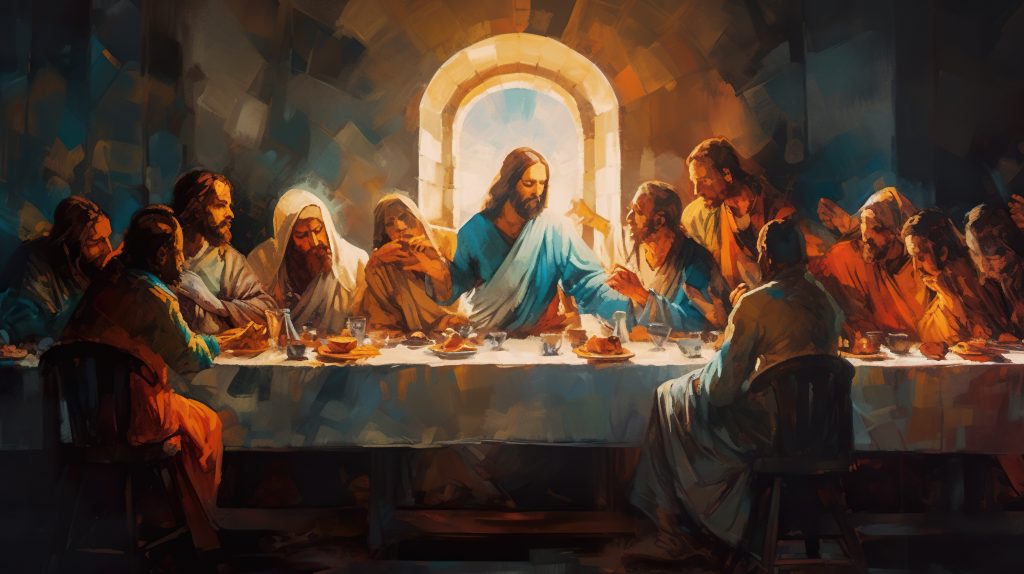
Communion
The timeless sacrifice
At Mass, you enter the timeless, heavenly liturgy. The world is rooted in time, but Jesus and His words are not.
“Take this, all of you, and eat of it, for this is My Body, which will be given up for you. … Take this, all of you, and drink from it, for this is the chalice of My Blood, the Blood of the new and eternal covenant, which will be poured out for you and for many for the forgiveness of sins. Do this in memory of Me.”
These words of consecration—through the power of the Holy Spirit and
said by an ordained priest in his sacramental identification with
Christ—bring about the presence of Jesus’ sacrifice, not symbolically,
but really: what happened then is made present now.
Realize what happened!
Jesus is present in His totality—Body, Blood, Soul, and Divinity—to fully accomplish His redemption. On the Cross, He “gained for us the graces of salvation. Through the Mass, He now communicates these graces to the whole human race” (Hardon). In Communion, He unites us to both His sacrifice and to His divine life now.
Pledge of eternal life
And what begins here is completed in Heaven. When we faithfully receive Christ in Communion, we also “receive the pledge of our bodily resurrection at the end of the world” (St. John Paul II).
“He who eats my flesh and drinks my blood has eternal life, and I will
—Jn 6:54—
raise him up at the last day.”
Communion is personal
After the Lamb of God, the priest lifts up the Host and proclaims the reality: “Behold the Lamb of God, behold him who takes away the sins of the world. Blessed are those called to the supper of the Lamb.”
Then, you take the centurion’s part (Matt 8:8) in what Pope Benedict calls the “I” prayer. At this point, the liturgy shifts from we to I: “Lord I am not worthy that you should enter under my roof, but only say the word and my soul shall be healed.” Jesus communicates Himself to your soul. No one says Amen for you; no one but you can give your heart to Jesus in love and adoration; no one but Jesus can give you His divine life. You give yourself as you receive Him. Communion is the most profound, personal act of faith and love you can offer Jesus. So, whenever possible, purify your heart by, first, seeking Jesus’ forgiveness in Confession.
Prepare for what will happen in Communion.
As people form a line, you remain kneeling, waiting for that moment of union with Him. The world around you matters little. In a sense, everyone else fades into the background as the object of our thoughts and heart—Jesus Christ—draws near. Take a moment to recall the fruits of Communion: CCC1391-98
- Intimate union with Jesus; union with the faithful in the Church.
- An increase and renewal of Baptismal grace.
- Resistance to sin; wiping away of venial sins.
- Commitment to the poor and greater unity with all Christians.
Then, approach Him in humble gratitude, marveling at His majesty and
loving forgiveness.
“When I see the heavens, the work of your hands…what is man that you should keep him in mind, mortal man that you care for him?”
—Ps 8:4—
As the Communion line draws you to Him physically, let the Holy Spirit draw you spiritually by opening your heart to Jesus in a short prayer: “Jesus, My God, I adore Thee here present in the Sacrament of Thy love!”
Discern how to adore Him.
You’ve now reached the front of the line. Grace helped you to realize what you believe—that Jesus, our Redeemer, is fully present, offering Himself to you. Now, what act of love and adoration is God calling you to make? Discern if Jesus calls you to kneel.
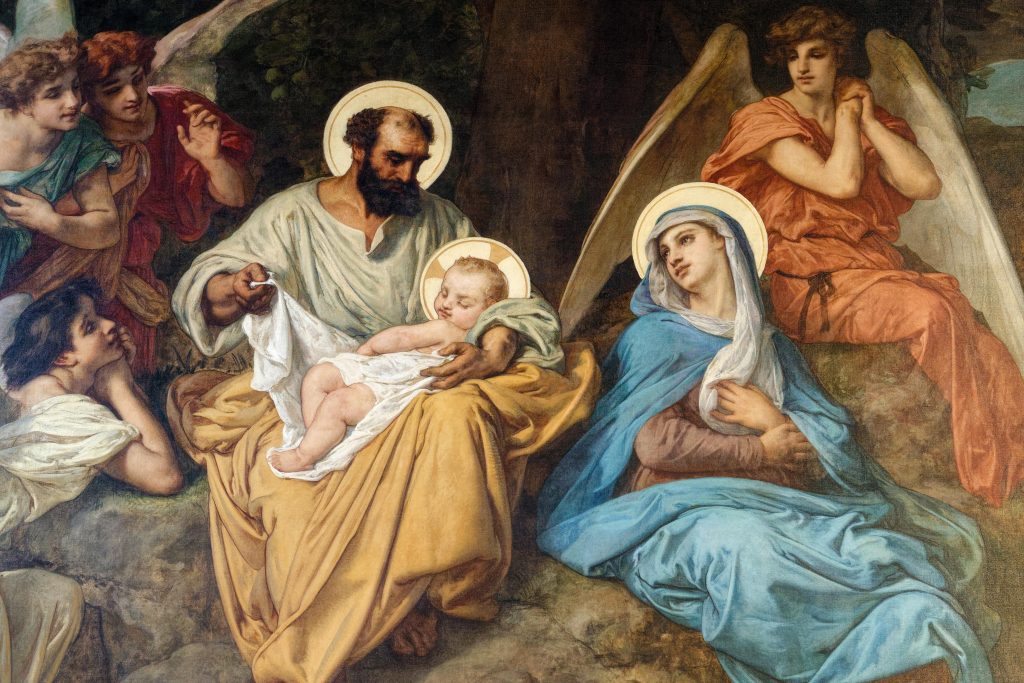
“[We are] overwhelmed, so deep is the humility by which God ‘stoops’ in order to unite himself with man!… We can only fall to our knees and silently adore this supreme mystery of faith.”
—St. Pope John Paul II—
The act of kneeling helps you to experience a deeper intimacy with Jesus. And it will quickly become the most natural way to express the adoration and love in your heart.
Amen.

Jesus presents Himself to you, waiting for your response. With a simple Amen, you make a confession of faith and love. St. Ambrose wrote, “What the mouth speaks, let the mind within confess; what the tongue
utters, let the heart feel”. Say what you believe. As you return to your pew and kneel, savor His presence within your soul in silence. Draw close to Him and pray the Anima Christi:
“Soul of Christ, sanctify me. Body of Christ, save me. Blood of Christ, inebriate me. Water from the side of Christ, wash me. Passion of Christ, strengthen me. O Good Jesus, hear me. Within thy wounds, hide me. Suffer me not to be separated from thee. From the malignant enemy, defend me. In the hour of my death, call me. And bid me come to thee. That with thy saints I may praise thee. Forever and ever. Amen.”
